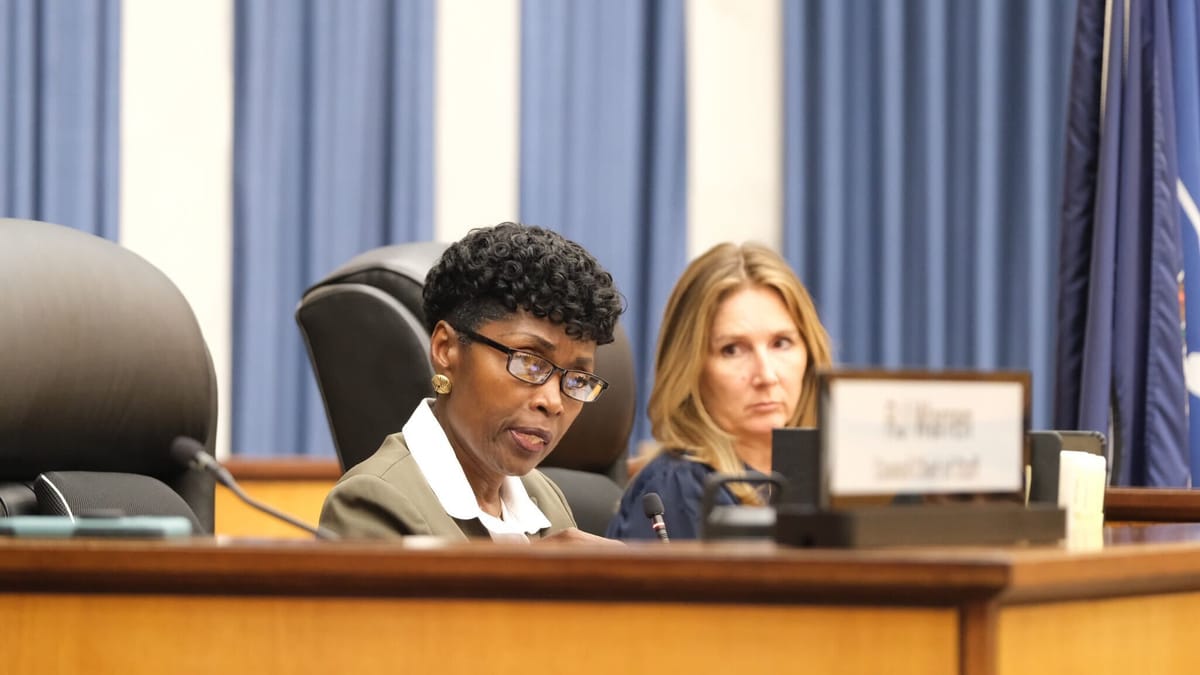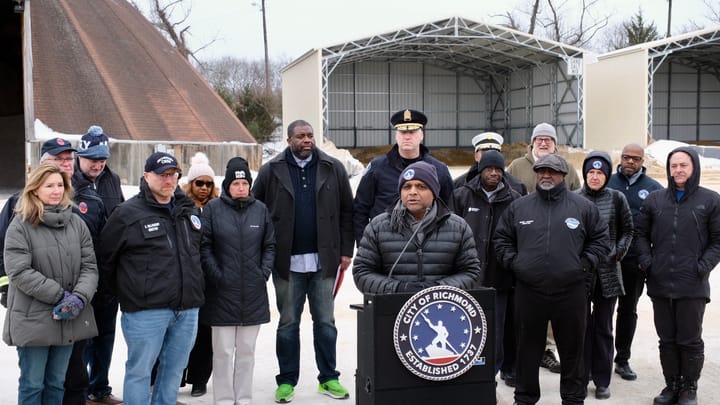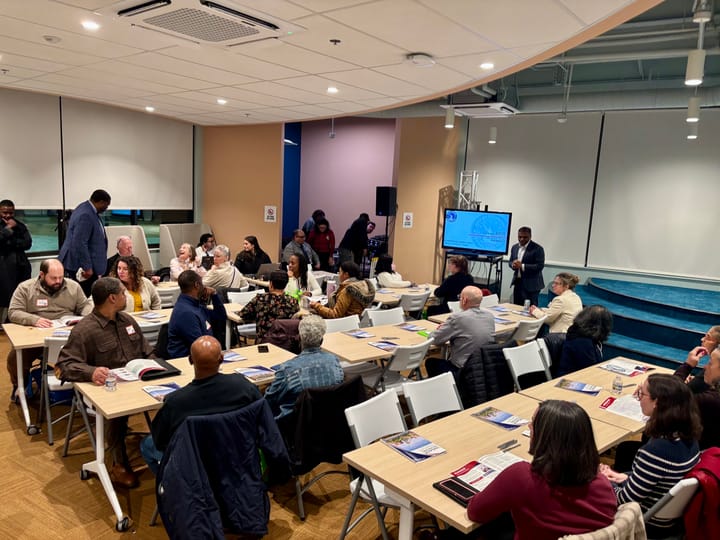Council recap: $5.8M budget transfer to pay wrongfully convicted man approved; affordable housing given a boost

It's our birthday week! Will you help us reach our goal of finding 50 new members to support local reporting?
In response to a new state law on restitution payments for wrongfully convicted people, the Richmond City Council approved a budget transfer Monday night to authorize a $5.8 million payment to Marvin Grimm.
The court system formally exonerated Grimm last year after he spent more than 40 years behind bars over the 1975 death of a local boy whose body was found in the James River. Grimm confessed to killing the boy and entered a guilty plea, but later said he was pressured into making a false admission of guilt through aggressive interrogation tactics and legally incorrect threats that he could be executed if he refused to confess.
“While nothing can undo the past, this action reflects our commitment to accountability,” Mayor Danny Avula said in a statement after the 8-1 vote. “It’s about facing challenges and making sure Richmond moves forward with integrity and fairness.”
Over the summer. Gov. Glenn Youngkin threatened to cut state funding for Richmond if the city didn’t approve the payment to Grimm. The governor made that threat after lawyers representing Grimm asked him to get involved because city officials seemed to be dragging their feet.
Grimm’s case is believed to be the longest wrongful incarceration in Virginia history. His lengthy imprisonment meant he was owed millions under a state law that calculates restitution amounts. And because of a recent change to state law, Richmond was on the hook to match a $5.8 million payment to Grimm the General Assembly committed to earlier this year.
As one of the first local governments to feel the financial impact of the new Virginia law, some city officials have called for state policymakers to revisit the process going forward, so other cities and counties aren’t stuck with sizable payments that weren’t budgeted in advance.
Council members largely agreed the city should pay Grimm to partially right a past wrong that happened in Richmond. But there was a dispute over where the city should get the money to do it, which grew into a wider discussion of city priorities and the basics of how the city government conducts business.
Avula’s administration suggested using the roughly $9 million balance that had built up in a special account funded by the city-overseen sales of properties long delinquent on taxes. However, the Council enacted a policy in 2019 that said some of that money should go to the Affordable Housing Trust Fund.
Officials dedicated tens of millions of dollars for that fund using onetime COVID-19 relief money, but have not made the annual transfers envisioned by the city policy. Some Council members and housing activists were upset that the city would now use that money to pay Grimm after failing to use it in accordance with the existing policy. Because the financial hit to the city was a result of alleged police misconduct, some activists argued Monday that the money should have come out of the police budget instead.
Councilor Kenya Gibson (3rd District) voted against the budget transfer, explaining her vote was simply a show of support for the concept that the city should follow laws the Council passes.
The disagreement appeared to be resolved in the last few days when the Avula administration agreed to move $2 million left in the tax sale fund to the Affordable Housing Trust Fund. Combined with $13 million already allocated to the fund in the current budget year, that addition would bring the total to $15 million.
That move will require more legislation expected to be introduced soon. The city is also planning to review and tighten existing policies to dedicate revenue to the affordable housing fund.
“I think we’ve provided a wealth of information through memos, letters and other things that have brought us here,” Chief Administrative Officer Odie Donald II told the Council as he recapped one of the most complex policy dilemmas he’s had to navigate since joining City Hall in July.
Councilor Ellen Robertson (6th District) who previously objected to the planned diversion of money she had tried to reserve for affordable housing. However, Robertson ended up voting in favor of the move Monday, saying she was convinced the mayor’s team would address her concerns.
“We’re going to trust. And we have a short window of opportunity for it to be verified,” Robertson said. “And I am confident that the Avula administration is going to do what is right.”
Whatever other issues the Grimm matter has raised, said Council President Cynthia Newbille (7th District), the city had an obligation to pay Grimm for the roughly 45 years he spent in prison.
“It doesn’t come close,” Newbille said of the money approved Monday. “But we must address it.”
It's our birthday week! Will you help us reach our goal of finding 50 new members to support local reporting?
Police oversight rules set for Civilian Review Board
In 2020, city officials approved the creation of a Civilian Review Board that would be empowered to review shootings by police officers and other sensitive issues like deaths or serious injuries to people in police custody and allegations of physical or verbal abuse.
The board hasn’t done much yet, because the Council had not approved a system of rules the police oversight board would operate under.
The Council approved those operating protocols Monday. The rules clarify how much power the review board will have, as well as how much access members will have to internal Richmond Police Department records.
The board will be “advisory” in nature. That means it will have the ability to review completed internal investigations and issue reports and recommendations to city policymakers, but won’t wield direct power over police disciplinary matters.
The board won’t have the ability to review cases when there is an active criminal investigation or disciplinary proceeding against an officer. The board also cannot review cases that spark active civil lawsuits. If a lawsuit is filed after the board has started a review, the protocols state, the board must suspend its review until the litigation is over.
The new oversight body will have the ability to initiate independent investigations, with the power to seek court subpoenas if necessary.
Though the board will have access to some police records treated as confidential, members can be removed from the board for making confidential information public.
The board will not have oversight of police financial decisions.
The Council approved the Civilian Review Board procedures as part of the consent agenda, meaning there was no public discussion or debate.
HR rules tweaked to make Council personnel decisions less public
In a change to its own policies, the Council approved revisions that will allow more Council staffing decisions to take place behind the scenes instead of being done via votes at public meetings.
The new system delegates more authority to the Council chief of staff to handle personnel decisions, without needing a formal vote from elected legislators.
Disputed Jahnke Road development gets greenlight
The Council approved a permit allowing a 17-unit housing development on Jahnke Road in South Richmond, across from Chippenham Hospital.
The project has drawn heavy opposition from some in the neighborhood, leading to a protracted review process by the city. The plan initially called for a convenience store in addition to the apartments, but the retail element was removed after neighbors raised concerns the store would be a vape outlet.
Contact Reporter Graham Moomaw at gmoomaw@richmonder.org
It's our birthday week! Will you help us reach our goal of finding 50 new members to support local reporting?






